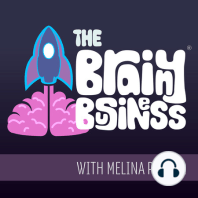53 min listen

246. Past, Present, and Future Biases (Refreshed Episode)
FromThe Brainy Business | Understanding the Psychology of Why People Buy | Behavioral Economics
246. Past, Present, and Future Biases (Refreshed Episode)
FromThe Brainy Business | Understanding the Psychology of Why People Buy | Behavioral Economics
ratings:
Length:
35 minutes
Released:
Dec 20, 2022
Format:
Podcast episode
Description
Today’s episode is another refresh from the series I did on “All the Biases” back in 2019. Two weeks ago on episode 242 we had the one on numbers-based bias called “Math is Hard” and this week is all about time. It focuses on the past and the future and how we don’t look at them in the same way, and how that can impact our behavior (it isn’t always the same and our preferences definitely change when we are looking forward versus backward) and how this changes the way we value things and so much more. I chose to refresh this episode today because this coming Friday, Dolly Chugh is on the show to talk about her new book, A More Just Future. We talk specifically about how the way we look backward isn’t the same as when we look forward, and how that impacts our likelihood to take action. Even when we are furious in the moment, and are adamant we will take action, because the past and future don’t impact our behavior the same way we often don’t. This can be really problematic when we are looking to right the wrongs of the past and present for a better future. As you listen today, I encourage you to consider how the past, present, and future are different for you. Think of a time when you were outraged by something in the moment and said (either aloud or in your head) that you were absolutely going to do or say something and never did. Why is that? When you remember that incident do you feel as upset about it? What if you heard it was going to happen tomorrow or a week from now? What might you do to prevent it? Why do the past and future feel different and how can this knowledge change the way you support other humans? Show Notes: [00:39] Today’s episode is another refresh from the series I did on “All the Biases” back in 2019. [01:39] Because the past and future don’t impact our behavior the same way, it can really be problematic when we are looking at history and helping to right the wrongs of the past and present. [03:48] People want immediate payoffs. [06:23] Due to impact bias, we overestimate the duration of the intensity of the impact of how we will feel in the future. We are also victims of projection bias. [08:26] To prove a point now you might be making a choice that negatively impacts your future self. [10:08] The sunk cost fallacy is where people will keep spending and justify pouring into a bad prior investment even though evidence shows it is bad. [12:37] As your brain gets overwhelmed your subconscious is more likely to take the reins, meaning you will make more battery and present-focused decisions instead of snowball, future-focused decisions. [14:05] In the cold state we may know that something is a good idea and commit ourselves that when you are in a hot state you don’t have the option to let that hot self take over and make a bad decision about the present. [16:03] People think that when you are in that cold state you're not going to require, need, or want whatever the things are as much as you actually will when your body chemistry has changed to the hot state. [16:49] People are impacted more by losses than gains and it takes double the joy felt by a gain to equal the pain that is felt by a loss. [18:03] You may consciously want to stop dreading something. However, as long as your subconscious is still getting some kind of reward or benefit from the physical act of dreading you would need a lot of extra savoring, positive benefit, and something to enjoy at the moment to combat the dread. [20:45] We do not really like risks and will avoid them when we can. Due to a zero risk bias, we humans prefer to reduce a small risk down to nothing than we would like to take a bigger reduction in a larger risk. [22:27] When you think you are safer, you are more likely to take risks in other areas. For example, people drive worse when wearing a seatbelt. [25:01] Because we don’t want to change, we may ostrich and avoid the potential negative even at our own personal cost. [26:13] For one person to succeed
Released:
Dec 20, 2022
Format:
Podcast episode
Titles in the series (100)
11. Anchoring & Adjustment: The 1 Word That Increased Sales 38%: Today’s behavioral economics podcast is another foundational episode focusing on anchoring and adjustment. My last foundational episode was and even though it has only been out about a week, it has been one of my most popular episodes to date. You... by The Brainy Business | Understanding the Psychology of Why People Buy | Behavioral Economics